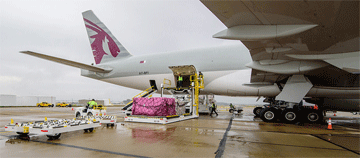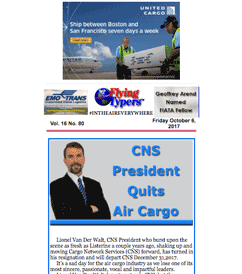|
When Apple unveiled its new iPhone X among a bevy of launches
in September, it was easy to see air freight’s Indian summer through
the prism of the electronic behemoth’s pre-launch shipments. Yet
that was not the only factor boosting demand on key lanes.
Will Bridget
Fidget?
Take fidget spinners, for example.
The kids craze has taken the world by storm
this year. By May, all 20 of the top-selling toys on Amazon were fidget
spinners or fidget cubes. One estimate suggests that during the first
six months of the year, 50m units of the product were sold – mostly
to consumers in Europe and the U.S.
 Focus
Lucas Keuhner Focus
Lucas Keuhner
Lucas Kuehner, Panalpina’s global
head of air freight, told FlyingTypers that new products had
contributed to keeping air freight markets buoyant in 2017. But he insisted
demand was strong across most verticals.
“We are not engaged with Apple, but
what we see is strong demand for electronics, industrial consumables,
auto and manufacturing, telecoms and, especially on the Transpac, a lot
of consumer goods,” he said. “There is growth across the board.
There’s no single market that’s not growing.
Spins A Tale
“Earlier in the summer, we had the
opportunity to fly these spinners, for example. This is dense cargo when
shipped in bulk. When it’s on the shelf and it’s hot it has
to go by air. This is an example of what leads to sudden capacity crunches
- two charters flown with this stuff eats into the market.”
No Slow Down
In Sight
Kuehner said demand had remained strong
on major lanes outbound-Asia through Q3, especially on the Transpacific
trade. “Demand from Asia has never really subsided since Q4 2016,”
he added. “The Far East to Europe lane dropped a little in Q3 compared
to Q1 this year and Q4 2016, but not to the levels of previous years –
in fact it wasn’t really even a dip, it just wasn’t as strong
as the Transpacific. And recently we have seen a bit of an uptick.”
Boosting
Markets Into Octember
“Export lanes out of Asia are not
the only ones enjoying heavy traffic,” Kuehner said “there
was currently significant volumes flowing from Europe in “all directions”,
while the Transatlantic and Latin American markets were also performing
strongly.”
At the end of September there was an expected
boost to markets. “It’s the end of the quarter so that drives
some additional volume and, with the Golden Week holidays and factories
closed at the start of October,” he explained. “expected shipments
right up to the start of the holidays further amplified demand.”
Indeed, Kuehner sees no sign of demand slowing
over the rest of the year. “As soon as business resumed post Golden
Week we headed into the peak season,” he said. “I don’t
expect another dip in demand out of Asia this year. We’re looking
at a long and deep peak season this year, similar to 2016.
“Carriers are also managing capacity
so we are expecting a crunch. Rates will likely spike in parallel to this
high Q4 demand leading into Q1 next year.”
However, he cautioned that year-on-year
volumes would probably not be as starkly higher in Q4 as during much of
2017 simply because Q4 2016 was so spritely.
“Relative growth rate might not be
as huge in Q4, because it’s against a much higher base, so it will
be down from the 10% year-on-year growth we’ve seen for much of
this year,” he added.
Grab Capacity
Not Just Blowing Smoke
Panalpina is warning customers they should
secure capacity now to avoid higher rates later in the year, albeit Keuhner
added the proviso that, this being the air cargo market, there were always
downside risks.
“What I explain to customers is this
is a prediction, but all the indicators I have including many, many conversations
with customers and carriers, is that with more product launches to come,
which also boosts component traffic, plus e-commerce performing strongly,
it all points to a strong peak,” he said.
“But it’s also unpredictable.
We are working intensively with customers so they can put aside capacity
with carriers so they have pre-procured capacity on different lanes.”
Busting Out
Charters Everywhere
Panalpina has already contracted more than
100 ad hoc full charter aircraft outbound from Asia ahead of Q4. “We
are prepared, but we will also buy capacity on the open spot market,”
he added. “We’re doing it early as rates might go to crazy
levels like we saw last year.”
Can It Get Worse?
He also said there were already shortages
of capacity on key lanes such as HKIA to LA. “That’s one where
I expect it to get worse,” he said. “As soon as we see the
crunch starting, we will implement our peak season plan arranged with
customers and carriers.
“Carriers are trying to drive the
rates up and the market is trying to establish new price points, which
is fair because fuel is higher than last year.
“The consequence for the client is
that they need to take this into consideration and shift their focus in
terms of how they procure capacity and the key to this is early engagement.
They need to secure capacity first and foremost so they can get products
on shelves on time.”
SkyKing
|






 Pittsburgh
International Airport Chief Executive Officer, Ms. Christina Cassotis, said:
"We are thrilled that Qatar Airways Cargo has selected
Pittsburgh as its next North American cargo destination. Known
for its world-class service, we are excited to welcome them as the first
international cargo service to fly from Pittsburgh International Airport."
Pittsburgh
International Airport Chief Executive Officer, Ms. Christina Cassotis, said:
"We are thrilled that Qatar Airways Cargo has selected
Pittsburgh as its next North American cargo destination. Known
for its world-class service, we are excited to welcome them as the first
international cargo service to fly from Pittsburgh International Airport."

